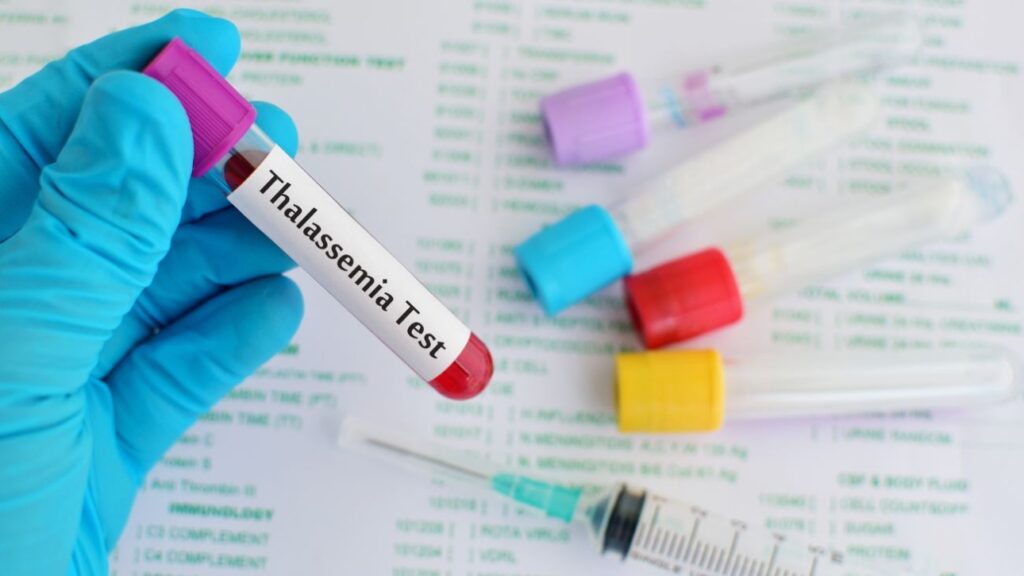Introduction
Living with thalassemia, a chronic and lifelong condition, can impact more than just physical health. The journey of managing symptoms, treatment routines, and lifestyle adjustments often affects mental health as well. Anxiety, depression, and feelings of isolation are common for people with chronic illnesses, including thalassemia. Understanding the mental health challenges and adopting strategies to cope with them is essential for maintaining a positive outlook and overall well-being. In this article, we’ll discuss the link between thalassemia and mental health, explore common emotional challenges, and provide tools for emotional resilience and support.
The Mental Health Impact of Thalassemia
People with thalassemia frequently undergo regular medical procedures, such as blood transfusions, iron chelation therapy, and constant monitoring, all of which can create a sense of dependency and may disrupt daily life. The physical symptoms of thalassemia, like fatigue, weakness, and limited energy, can also affect work, social activities, and overall quality of life. This can lead to feelings of frustration, sadness, and isolation, which may develop into more serious mental health concerns.
Some of the common mental health challenges faced by individuals with thalassemia include:
Depression and Anxiety
- Symptoms: Feelings of sadness, irritability, fatigue, loss of interest in activities, and persistent worry are common. Anxiety about future health, treatment outcomes, and life expectancy can compound these feelings.
- Impact: Depression and anxiety can affect relationships, work, education, and self-esteem, making it harder to stay engaged in life.
Feelings of Isolation
- Causes: Managing a chronic illness often requires lifestyle changes that can limit social interactions. Young people, especially, may feel left out of activities or friendships, leading to loneliness.
- Impact: Isolation can further intensify feelings of sadness and low self-worth, contributing to depression and social withdrawal.
Stress and Emotional Burnout
- Causes: The demands of managing thalassemia, including doctor’s appointments, treatment routines, and symptoms, can create mental and emotional fatigue. This can lead to burnout, where one feels overwhelmed and unable to manage day-to-day challenges.
- Impact: Chronic stress and burnout can impair focus, motivation, and energy, affecting work, education, and personal relationships.
Fear and Uncertainty about the Future
- Causes: Chronic illnesses like thalassemia can create worries about the future, including concerns about physical health, independence, and life expectancy. Fear of medical complications, such as iron overload, can add to these anxieties.
- Impact: Fear of the unknown can lead to avoidance behaviors, where people may withdraw from certain activities or relationships due to concern about their health.
Strategies for Managing Mental Health with Thalassemia
It’s essential for people with thalassemia to prioritize their mental health alongside their physical health. Building resilience, seeking support, and creating a self-care routine can make a significant difference. Here are several strategies that can help:
Establish a Support Network
- Seek Social Connections: Connect with others who understand your experience, such as joining a thalassemia support group. These connections provide not only a sense of belonging but also practical advice and shared experiences. Online communities and local groups can be great resources.
- Lean on Family and Friends: Discuss your feelings with trusted loved ones. They can offer emotional support and understanding. Encourage them to learn about thalassemia so they can be more supportive.
Practice Self-Care
- Mindfulness and Meditation: Practicing mindfulness or meditation can help calm the mind and reduce anxiety. Apps like Headspace and Calm offer guided meditations and breathing exercises that are accessible for beginners.
- Regular Exercise: Physical activity, even gentle exercises like walking, yoga, or stretching, releases endorphins, which improve mood and reduce stress. Choose activities that suit your energy levels, and don’t push yourself too hard.
- Maintain a Healthy Sleep Routine: Prioritize sleep, as it is essential for both physical and mental recovery. Aim to go to bed and wake up at the same time each day, and create a calming nighttime routine to improve sleep quality.
Set Realistic Goals and Boundaries
- Be Kind to Yourself: Living with thalassemia often requires prioritizing health over other commitments. Set realistic goals for what you can accomplish each day and allow yourself flexibility. Celebrate small achievements, whether it’s completing a task, attending an appointment, or practicing self-care.
- Communicate Boundaries: Explain your needs to people around you and set boundaries if needed. It’s okay to say no or ask for accommodations when you’re feeling unwell or overwhelmed.
Address Feelings of Guilt and Self-Worth
- Acknowledge Your Strengths: Managing a chronic illness requires strength, resilience, and courage. Acknowledge your strengths and accomplishments, no matter how small. Focus on what you can do, rather than what you can’t.
- Challenge Negative Thoughts: Guilt, shame, or frustration can be common, especially if your condition limits what you can do. When negative thoughts arise, practice challenging them by focusing on positive affirmations or reminding yourself of your efforts and progress.
Educate Yourself About Thalassemia
- Knowledge Empowers: Understanding your condition, its treatments, and long-term management can reduce fear and empower you to make informed choices. Knowing what to expect can lessen anxieties and help you feel more in control.
Professional Mental Health Support
While self-care strategies are essential, professional mental health support can provide additional guidance and coping tools. Here are some options to consider:
Therapy and Counseling
- Benefits: Speaking to a licensed therapist or counselor can help you explore complex emotions, develop coping strategies, and find healthy ways to manage stress. Cognitive Behavioral Therapy (CBT) is particularly effective for anxiety and depression and helps address negative thought patterns.
- Finding a Therapist: Look for a therapist with experience in chronic illness or health psychology, as they can better understand your unique challenges. Many clinics and hospitals also offer counseling services specifically for patients with chronic conditions.
Support Groups and Peer Counseling
- Community and Connection: Joining a thalassemia support group allows you to share experiences, learn from others, and find emotional support. Some groups offer peer counseling, where you can connect with someone who has firsthand experience living with thalassemia.
Medication if Needed
- Consideration for Severe Cases: If anxiety or depression becomes severe, your doctor may recommend medication to help stabilize your mood. Antidepressants or anti-anxiety medications may be prescribed alongside therapy to help manage symptoms. Medication isn’t always necessary but can be a valuable option for some individuals.
Building Resilience in the Face of Chronic Illness
Resilience is the ability to adapt and bounce back from adversity, and it’s a skill that can be cultivated. Living with thalassemia may bring unexpected challenges, but resilience can help you face them with courage and optimism.
Focus on Your Strengths and Achievements
- Celebrate Milestones: Each successful transfusion, appointment, or treatment session is an accomplishment. Celebrate the steps you take to manage your health, as they reflect your strength and resilience.
Find Meaning and Purpose
- Engage in Activities You Love: Whether it’s art, music, reading, or any hobby that brings you joy, engaging in activities you love can provide a sense of purpose and lift your spirits. Many people with chronic illnesses find meaning in volunteering, advocacy, or supporting others in similar situations.
Cultivate a Growth Mindset
- Adopt a Positive Perspective: Embrace challenges as opportunities for growth and learning. Developing a positive outlook doesn’t mean ignoring difficulties, but rather focusing on the lessons each experience offers.
Frequently Asked Questions about Mental Health and Thalassemia
Is it normal to feel down or anxious sometimes?
- Yes, it’s entirely normal to feel down, anxious, or overwhelmed, especially when dealing with a chronic illness. Many people with thalassemia experience fluctuations in mood, but support and coping strategies can help manage these feelings.
How can I explain my mental health needs to others?
- Communication is key. Try sharing a simple explanation of how thalassemia affects you and how it influences your mental health. Most people will appreciate your openness and be more understanding of your needs.
What if self-care isn’t enough?
- Sometimes, self-care may not be enough to manage mental health challenges. Reaching out to a mental health professional is a positive step towards improving your well-being. Therapy, support groups, or medication, if recommended, can make a significant difference.
Conclusion
Living with thalassemia requires strength, resilience, and adaptability, as well as a proactive approach to mental health. The emotional challenges are real, but with self-care strategies, a strong support network, and professional guidance, you can foster a positive outlook and lead a fulfilling life. Remember, you’re not alone—many others share similar experiences



